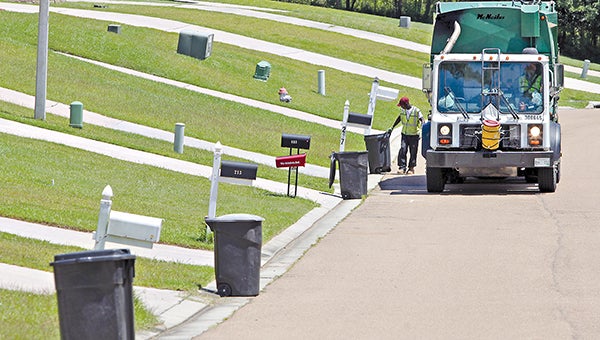Supervisors discuss ways to collect $1.3 million in back garbage fees
Published 3:59 pm Monday, January 13, 2020

- A Waste Management crew collects garbage on Falcon Ridge Road in this file photo from 2014. (Justin Sellers/The Vicksburg Post)
Warren County has a $1.3 million trash problem.
During a work session Monday, members of the Warren County Board of Supervisors discussed the best way to collect more than $1.3 million in garbage pick-up fees that were ignored by county citizens for years.
In its long-standing relationship with Waste Management, the county is required to pay for any garbage contract if it falls into default with the company, meaning if a resident stops paying their Waste Management bill, the county is required to pay it. Then, it becomes the county’s responsibility to collect from the resident what is owed.
Also, in the agreement with the Mississippi Department of Environmental Quality, the county nor Waste Management can at no time stop providing garbage service to a customer for non-payment.
Katie Martin, the county’s environmental officer, told supervisors to date, the county is owed $688,923.07 from what it considers active accounts, which are accounts that are continuing to receive garbage service. The county is owed an additional $649,048.59 from what it considers closed accounts, or accounts that are no longer receiving service. Those two categories total the more than $1.3 million on the books.
In one example, Martin told supervisors of one customer in particular that owes the county $2,538.99 for servicing dating back to 2002.
In the new contract with Waste Management, which was approved by the previous Board of Supervisors last year and went into effect Oct. 1, Waste Management charges a residential customer $62.46 per quarter for service. Of that amount, Waste Management pays the county $1.25 per quarter.
Martin said it is those funds from Waste Management the county uses to pay back to Waste Management for any delinquent customers.
During Martin’s update, supervisors tried to determine what tools were at their disposal to collect what is owed to the county.
“We have used collection firms to some success,” Martin said. “But, they always start out strong and then fizzle out.”
The most-recent collection contract was with Pioneer Credit Recovery, which expired in December.
Martin said she sends a number of letters to those accounts with outstanding balances but has not found the best solution yet to getting what is owed.
She also mentioned around 2012 and 2013, the county had tried tying outstanding garbage fees to the renewal of license plates, but that it ended up not being effective.
“I don’t know why, but it wasn’t” Martin said following the meeting. “If someone could not pay the bill, then they would claim if they couldn’t get their tag, then they couldn’t go to work and could never pay what was owed. In some cases, we would allow them to pay $10 to $15 of what was owed with the promise they would pay the rest, but we would never see them again.”
Martin said it was up to the discretion of the county administrator whether to hold firm to levying the unpaid garbage fee to the license plate or letting it slide.
After the discussion, supervisors instructed county attorney Blake Teller to work with Martin on writing the next letter that was set to be mailed. In the letter, supervisors asked the message detail all collection efforts, including tying the garbage fees to license plate renewals and event taking it one step further of tying the garbage fees to someone’s state income tax refund.
Supervisors also asked Vinson to prepare information on bidding out collection services again, this time with the intent of selecting a primary collection firm and a number of alternates that could be used if and when the primary collection company’s efforts “fizzle out.”






